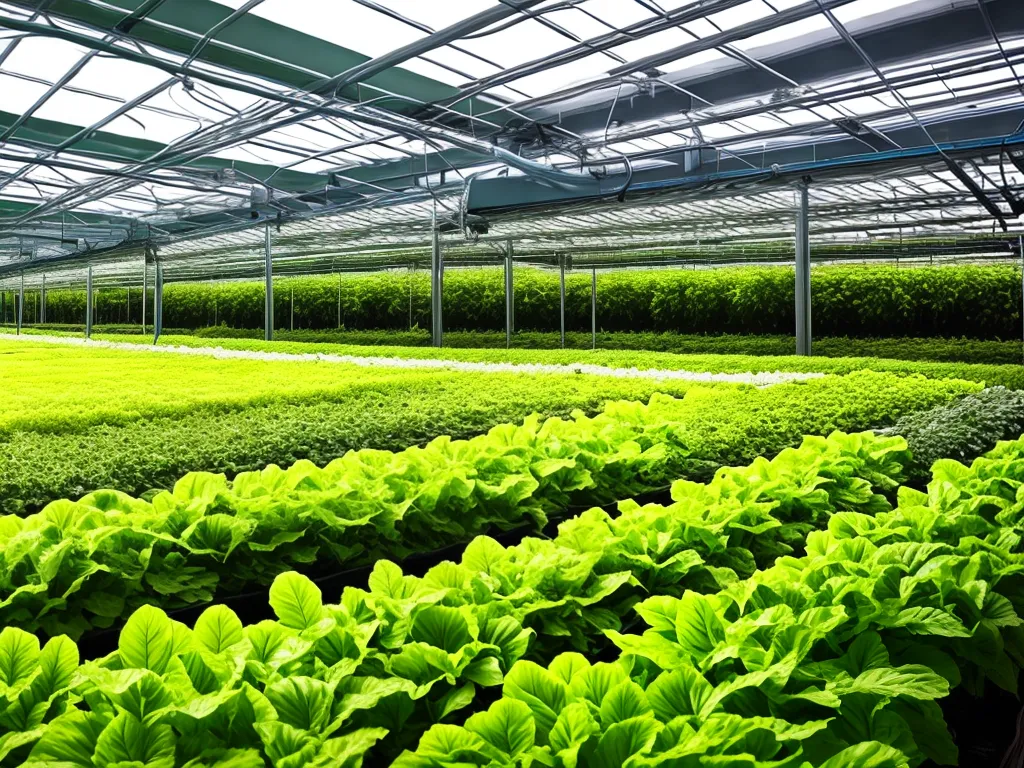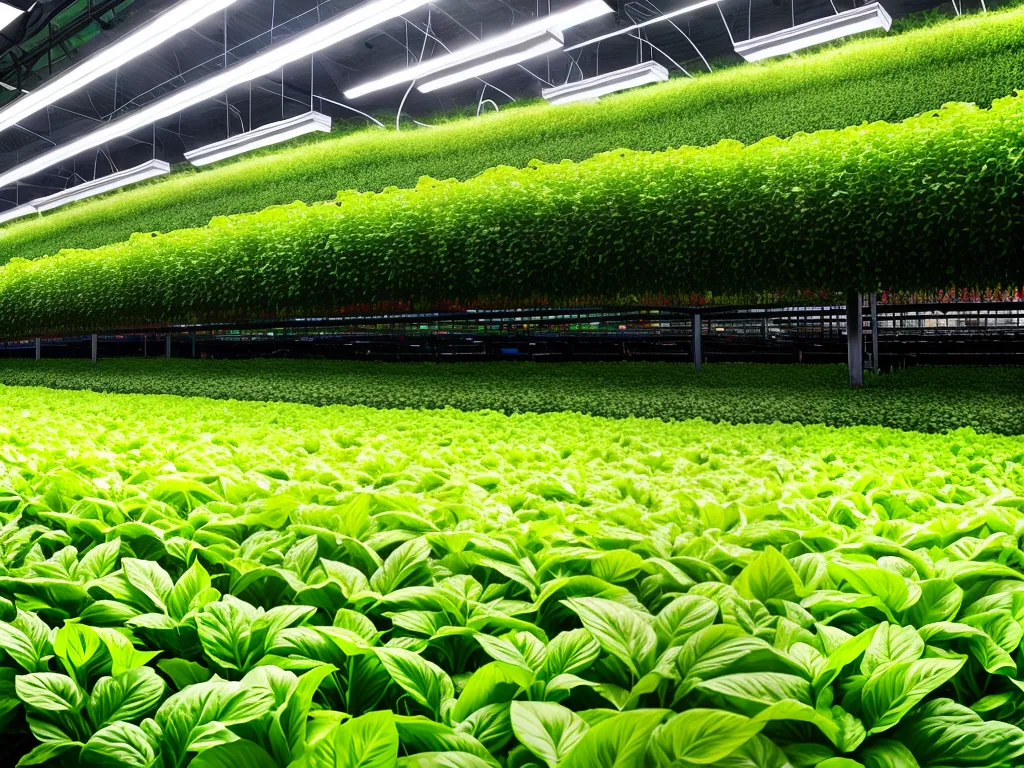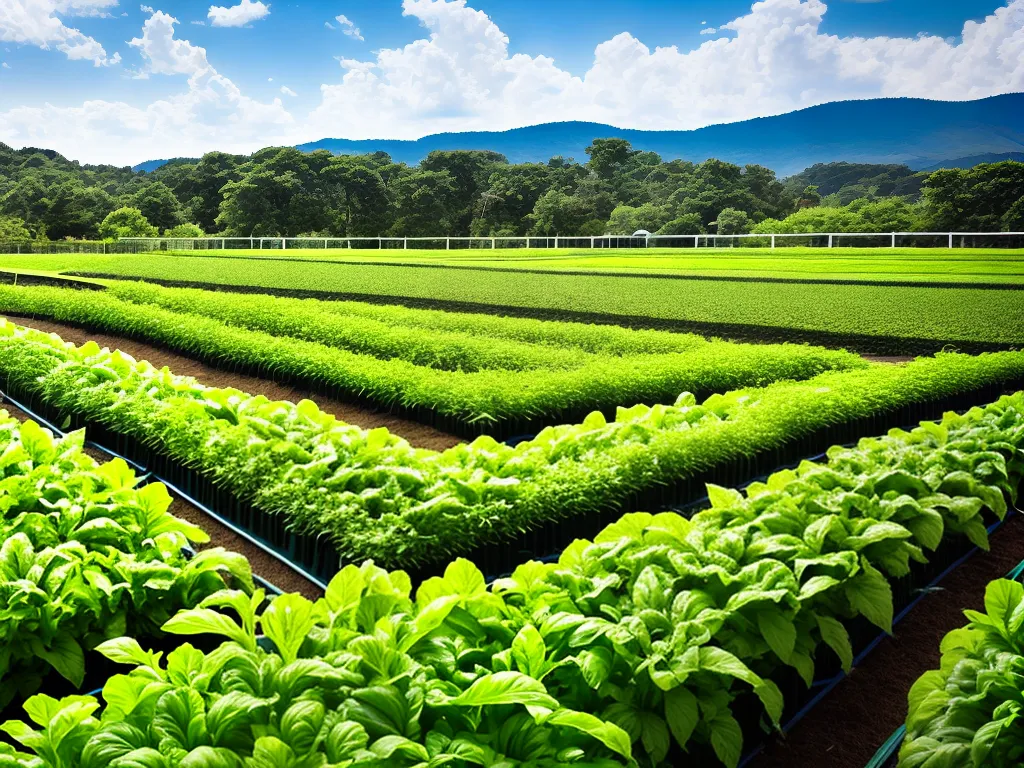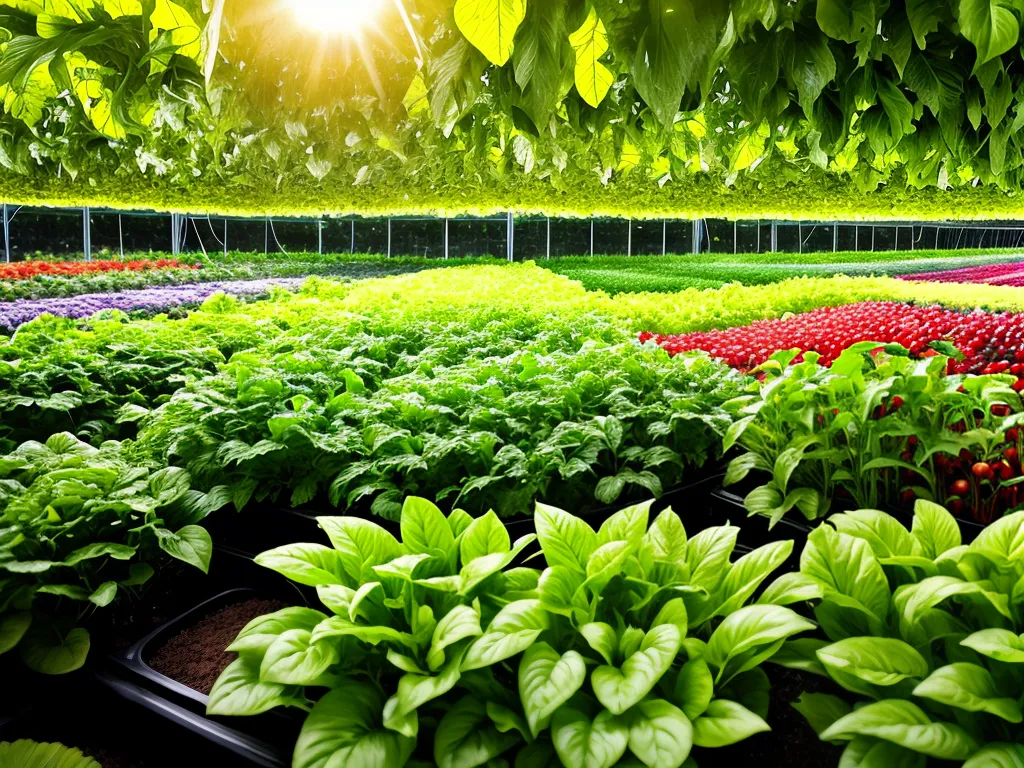Olá pessoal! Vocês já pararam para pensar como é importante a agricultura para a nossa vida? Sem ela, não teríamos alimentos para nos alimentar. Mas será que estamos fazendo o melhor uso dos recursos disponíveis para produzir alimentos? Você sabia que a técnica de hidroponia pode revolucionar a agricultura e reduzir a importação de alimentos?
A hidroponia é um método de cultivo em que as plantas são cultivadas em água com nutrientes, sem a necessidade de solo. Isso significa que podemos produzir alimentos em espaços menores e com menos água do que na agricultura convencional. Além disso, essa técnica possibilita o controle total do ambiente em que as plantas crescem, o que resulta em uma produção mais rápida e saudável.
Mas como a hidroponia pode ajudar a reduzir a importação de alimentos? Com essa técnica, podemos produzir alimentos o ano todo, independentemente das condições climáticas. Isso significa que não precisamos mais depender da importação de alimentos de outros países quando há escassez em nosso próprio país.
E você, já conhecia a hidroponia? O que acha dessa técnica revolucionária na agricultura? Quer saber mais sobre como ela pode ajudar a reduzir a importação de alimentos? Então continue acompanhando nosso blog!

Resumo de “Revolutionizing Agriculture: Hydroponics Reducing Food Imports”:
- Hydroponics is a soilless farming method that uses nutrient-rich water to grow plants.
- Hydroponics allows for year-round crop production and reduces the need for land and water resources.
- Hydroponics can be used in urban areas, reducing the distance food needs to travel to reach consumers.
- Hydroponics can also reduce the need for pesticides and herbicides, creating a healthier food source.
- By reducing the need for food imports, hydroponics can increase food security and boost local economies.
- Hydroponics is a sustainable farming method that has the potential to revolutionize agriculture.

The Hydroponic Solution: A Reliable and Sustainable Method to Grow Crops
Agriculture has been around for thousands of years, but it’s only in recent times that we’ve seen a revolution in the way we grow crops. One of the most promising methods is hydroponics, a system that allows plants to grow without soil. Instead, they are grown in nutrient-rich water solutions.
Hydroponics offers many advantages over traditional farming methods. For one, it’s much more efficient. Plants grown hydroponically can grow up to 50% faster than those grown in soil. This is because they have access to all the nutrients they need, and they don’t have to compete with other plants for resources.
Another advantage is that hydroponics is much more sustainable. Because plants are grown in water, there’s no need for pesticides or herbicides. This means that hydroponic farms produce much less waste and pollution than traditional farms.
Busting the Myths about Hydroponics and its Benefits for Agriculture
There are many myths surrounding hydroponics, but most of them are unfounded. For example, some people believe that hydroponic crops don’t taste as good as those grown in soil. However, this is simply not true. In fact, many hydroponic crops are known for their superior taste and texture.
Another myth is that hydroponics is too expensive for small-scale farmers. While it’s true that hydroponic systems can be costly to set up, they can actually be more cost-effective in the long run. This is because they require less water and fertilizer than traditional farming methods.
How Hydroponics Can Help Reduce Dependence on Food Imports
One of the biggest advantages of hydroponics is that it can help reduce our dependence on food imports. Many countries rely on imported food to meet their nutritional needs, but this can be expensive and unsustainable in the long run.
Hydroponic farms can be set up anywhere, even in urban areas where space is limited. This means that countries can produce their own food locally, without having to rely on imports. This can help reduce food insecurity and improve the health of local communities.
Sustainable Agriculture in Action: The Success Stories of Hydroponic Farms
There are many success stories of hydroponic farms around the world. For example, in Singapore, a company called Sky Greens has built a vertical hydroponic farm that produces vegetables for the local market. The farm is incredibly efficient, using only 5% of the water that traditional farms use.
Another success story comes from Japan, where a company called Mirai has built a hydroponic farm that produces lettuce using LED lights. The farm is so efficient that it can produce lettuce year-round, even in the middle of winter.
The Advantages of Hydroponics for Urban Farming and Local Food Production
Hydroponics is particularly well-suited for urban farming and local food production. This is because it allows crops to be grown in small spaces, such as rooftops and balconies. It also allows for year-round production, which is important in urban areas where fresh produce can be hard to come by.
❤️Seus amigos estão gostando:
In addition, hydroponic farms can be set up close to where people live, reducing transportation costs and emissions. This can help make local food more affordable and accessible to everyone.
Breaking Barriers: Making Hydroponics Accessible for Small-Scale Farmers
One of the challenges of hydroponics is that it can be expensive to set up. However, there are many initiatives underway to make hydroponics more accessible to small-scale farmers.
For example, some companies are developing low-cost hydroponic systems that can be built using locally-sourced materials. Others are offering training and support to farmers who are interested in setting up hydroponic farms.
The Future of Agriculture: Embracing Hydroponics as a Promising Alternative to Conventional Farming
Hydroponics is still a relatively new technology, but it has the potential to revolutionize the way we grow crops. As we face increasing challenges from climate change and population growth, it’s important that we explore new and innovative ways to produce food.
Hydroponics offers many advantages over traditional farming methods, including increased efficiency, sustainability, and local food production. As more and more farmers and consumers embrace this technology, we can look forward to a more sustainable and secure food system for everyone.

| Coluna 1 | Coluna 2 | Coluna 3 |
|---|---|---|
| Hydroponics | Hydroponics is a method of growing plants without soil, using mineral nutrient solutions in a water solvent. This allows for more efficient use of resources like water and fertilizer, as well as faster growth and higher yields. | Saiba mais sobre hidroponia |
| Reducing Food Imports | Hydroponics can help reduce the need for food imports by allowing for year-round production of fresh produce, regardless of climate or season. This can also help reduce transportation costs and carbon emissions associated with importing food from other countries. | Saiba mais sobre segurança alimentar |
| Efficient Resource Use | Hydroponics allows for more efficient use of resources like water and fertilizer, as the nutrient solutions can be recycled and reused. This can help reduce water usage and nutrient runoff, which can have negative environmental impacts. | Saiba mais sobre agricultura sustentável |
| Faster Growth and Higher Yields | Hydroponics can allow for faster growth and higher yields, as plants receive the nutrients they need directly and can focus their energy on growth rather than searching for nutrients in the soil. This can also help reduce the amount of land needed for agriculture. | Saiba mais sobre produtividade agrícola |
| Challenges and Limitations | While hydroponics has many benefits, it also presents challenges and limitations, such as the initial investment required for equipment and infrastructure, the need for specialized knowledge and skills, and the potential for disease and pest outbreaks in closed systems. | Saiba mais sobre os desafios da hidroponia |

1. O que é hidroponia?
R: Hidroponia é um método de cultivo de plantas sem solo, onde as raízes são imersas em uma solução nutritiva.
2. Por que a hidroponia pode reduzir a dependência de importações de alimentos?
R: A hidroponia permite o cultivo de plantas em qualquer lugar e em qualquer época do ano, o que pode aumentar a produção local de alimentos e reduzir a necessidade de importações.
3. Quais são as vantagens da hidroponia?
R: A hidroponia permite maior controle sobre o ambiente de cultivo, menor uso de água e fertilizantes, maior produtividade e menor uso de espaço físico.
4. Quais são as desvantagens da hidroponia?
R: A hidroponia pode ser mais cara para instalar e manter do que os métodos tradicionais de cultivo, além de exigir conhecimento técnico especializado.
5. Quais são as plantas mais comuns cultivadas na hidroponia?
R: Alface, tomate, pepino e morango são algumas das plantas mais comuns cultivadas na hidroponia.
6. Como funciona a solução nutritiva utilizada na hidroponia?
R: A solução nutritiva contém todos os nutrientes necessários para o crescimento das plantas, incluindo nitrogênio, fósforo, potássio e micronutrientes como ferro e zinco.
7. Como é feita a irrigação das plantas na hidroponia?
R: A irrigação é feita por meio de um sistema de gotejamento ou por aspersão, que distribui a solução nutritiva de forma uniforme.
8. Como é feito o controle de pragas e doenças na hidroponia?
R: O controle de pragas e doenças na hidroponia é feito por meio do uso de produtos biológicos, como insetos predadores e fungos benéficos.
9. É possível cultivar plantas orgânicas na hidroponia?
R: Sim, é possível cultivar plantas orgânicas na hidroponia, desde que se utilize uma solução nutritiva orgânica e sejam seguidas as normas de certificação.
10. Quais são as principais diferenças entre a hidroponia e a agricultura convencional?
R: Na hidroponia, as plantas são cultivadas sem solo e em um ambiente controlado, enquanto na agricultura convencional as plantas são cultivadas em solo e estão sujeitas às variações climáticas.
11. A hidroponia pode ser utilizada em áreas urbanas?
R: Sim, a hidroponia pode ser utilizada em áreas urbanas, como em telhados, varandas e quintais.
12. Como a hidroponia pode contribuir para a sustentabilidade ambiental?
R: A hidroponia pode contribuir para a sustentabilidade ambiental por meio do uso eficiente de água e fertilizantes, da redução do uso de pesticidas e da produção local de alimentos.
13. Como a hidroponia pode contribuir para a segurança alimentar?
R: A hidroponia pode contribuir para a segurança alimentar por meio do aumento da produção local de alimentos, da redução da dependência de importações e da produção de alimentos mais frescos e saudáveis.
14. Quais são os custos envolvidos na instalação de um sistema hidropônico?
R: Os custos envolvidos na instalação de um sistema hidropônico podem variar de acordo com o tamanho e a complexidade do sistema, mas geralmente incluem os custos dos equipamentos, materiais de construção e solução nutritiva.
15. Como posso começar a cultivar plantas na hidroponia em casa?
R: É possível começar a cultivar plantas na hidroponia em casa com a ajuda de kits de cultivo hidropônico disponíveis no mercado ou seguindo tutoriais online para construir seu próprio sistema.
- Chá de Pitanga: Descubra os Benefícios Desta Bebida Tropical - abril 7, 2024
- Benefícios do Gengibre: Uma Raiz que é um Tesouro para a Saúde - abril 3, 2024
- Benefícios Incríveis das Folhas de Louro: Muito Mais do que um Tempero - abril 3, 2024